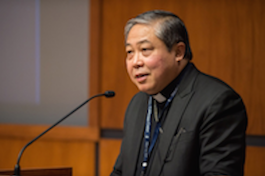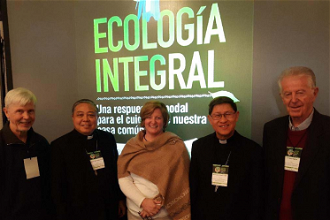Vatican envoy tells UN: Trafficking of children is abominable

Archbishop Auza
The Permanent Observer of the Holy See to the United Nations, Archbishop Bernardito Auza, has told the United Nations the trafficking of children is "abominable."
"While human trafficking always exploits the vulnerable, the trafficking of children and youth exploits those most vulnerable of all, something that not only exposes the evil of trafficking in all its repulsive ugliness but something that likewise makes abundantly clear the urgent call for everyone to rise up to protect children, youth and everyone from those who would enslave and dehumanize them in these ways," he said.
The full text of Cardinal Auza's address follows:
Elimination The Trafficking Of Children And Youth
By HE Archbishop Bernardito Auza
Apostolic Nuncio and Permanent Observer of the Holy See to the United Nations
Remarks of Archbishop Bernardito Auza
Apostolic Nuncio and Permanent Observer of the Holy See to the United Nations Eliminating the Trafficking of Children and Youth
United Nations, New York July 13, 2016
Your Excellencies, Distinguished Panelists, Ladies and Gentlemen,
The Holy See has long spoken out against the evil of human trafficking, forced labour and all forms of modern slavery. And through the dedicated work of so many Catholic religious institutes, national and diocesan programs, and groups of faithful the Catholic Church has sought to fight to address its various causes, care for those it victimizes, wake people up to the scourge, and work with anyone and everyone to try to eliminate it. The Second Vatican Council, St. John Paul II, and Pope Benedict XVI all spoke out passionately and forcefully against the infamy of human trafficking and the widespread hedonistic and commercial culture that encourages this systematic exploitation of human dignity and rights.
Pope Francis has taken the Church's advocacy and action to another level through his aggressive and incessant denunciation of this social cancer. He dedicated part of his address to the UN General Assembly to it. He wrote about it in his encyclical Laudato Si': On Care for Our Common Homeand in his pastoral plan for the New Evangelization entitled The Joy of the Gospel. He devoted the entirety of his 2015 Message for the World Day of Peace to the subject, making it a key priority of international diplomacy for the Holy See. He has spoken about it to newly accredited diplomats, to international religious leaders, to an alliance of international police chiefs and Church leaders, to social scientists and scholars, to mayors from across the globe, to judges and to various conferences throughout the world. And he hasn't merely been talking: He's been taking action, catalyzing the Holy See's hosting conferences, spearheading the 2014 Joint Declaration of Religious Leaders against Modern Slavery and willed the creation of the Santa Marta Group, named after his residence in the Vatican, which brings together Catholic leaders and international law enforcement officials to battle this scourge.
His essential message has been that we are dealing with an "open wound on the body of contemporary society," "a crime against humanity," and an "atrocious scourge" that is occurring in many of our own neighborhoods. We cannot remain indifferent before the knowledge that human beings are being bought and sold like objects, even assaulted and killed like abused animals, and that we must together address the economic, environmental, political, anthropological and ethical components of the crisis. When he was here at the UN last September, he called for "concrete steps and immediate measures for ... putting an end as quickly as possible to the phenomenon of ... human trafficking, ... the sexual exploitation of boys and girls, [and] slave labor, including prostitution," stressing, "We need to ensure that our institutions are truly effective in the struggle against all these scourges."
Toward this end, he said that the 2030 Agenda for Sustainable Development was "an important sign of hope," insofar as it focused, in three different targets, the attention and commitment of the world to confront this plague. In Targets 5.2 and 8.7, the international community committed itself to "eliminate all forms of violence against all women and girls in the public and private spheres, including trafficking and sexual and other types of exploitation," and "take immediate and effective measures to eradicate forced labor, end modern slavery and human trafficking." Those are important steps forward and, together with the Santa Marta Group, the Holy See sponsored on April 7th a very well-attended conference to try to concretize this work.
In today's conference, we want to focus in a particular way on the third commitment relating to eliminating modern slavery, Target 16.2, which obliges the international community to "end abuse, exploitation, trafficking and all forms of violence against and torture of children" by 2030. The trafficking of anyone, no matter what age, is a crime against humanity. But there is something particularly abominable about submitting children to these barbarities. As a Christian and a Catholic bishop, I cannot fail to recall how Jesus reserves his strongest condemnation for those who hurt children, saying that it would be better for such violators to have a millstone tied around their neck and thrown into the depth of the sea than to face God's judgment for such deeds (Mt 18:6).
Jesus said this because he knows that children are particularly vulnerable and owed a higher level of loving protection. While human trafficking always exploits the vulnerable, the trafficking of children and youth exploits those most vulnerable of all, something that not only exposes the evil of trafficking in all its repulsive ugliness but something that likewise makes abundantly clear the urgent call for everyone to rise up to protect children, youth and everyone from those who would enslave and dehumanize them in these ways. On behalf of the Holy Father Pope Francis and in my own name, I thank you for coming this afternoon to show solidarity with the children who are victims of trafficking in persons and to express the strongest condemnation possible of this crime.
This conference will seek to make real the faces of the nearly two million children and youth who are presently being trafficked and speak about what's working, what's not working, and what needs to be done to free them, help them recover, and prevent other young people from suffering as they have. We have a powerful program today. We will hear from someone who was trafficked as a child and is now helping to liberate and care for other survivors. We'll hear from someone who in her powerful advocacy for victims has interviewed hundreds and will be presenting what she's learned from their compelling stories. We'll hear from top experts from the UN Office on Drugs and Crime and the International Labour Organization about the big picture and what's being done at an international level. And we'll hear about two particularly troubling dimensions of this crisis: the trafficking of homeless youth and the use of the internet to enslave and traffic the young.
I would like to conclude my Remarks with the words that Pope Francis wrote for our April 7 Event on Ending Human Trafficking by 2030 and the Role of Global Partnerships in Eradicating Modern Slavery: "In your discussions," Pope Francis wrote, "I hope also that you will keep before you the dignity of every person, and recognize in all your endeavors a true service to the poorest and most marginalized of society, who too often are forgotten and have no voice." Working together with perseverance we can eliminate the trafficking of children and youth and together achieve Target 16.2, to "end abuse, exploitation, trafficking and all forms of violence against and torture of children" by 2030.
Thank you and welcome to this Conference!
Source: Vatican Press Office


















